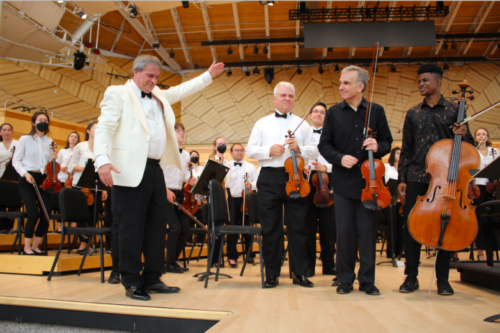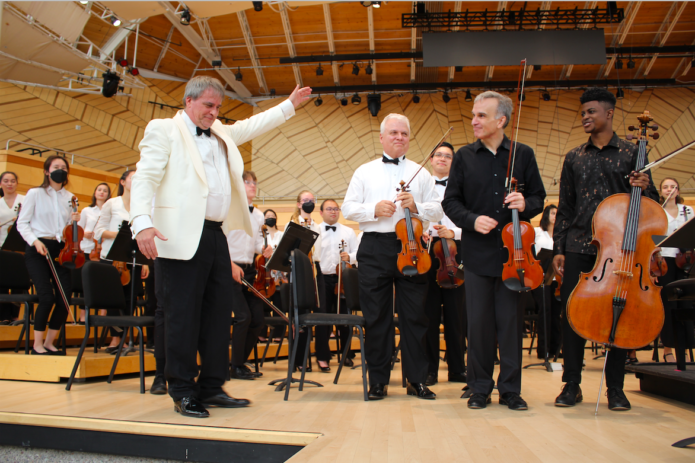
 United States Aspen Music Festival 2022 [5]: (HS)
United States Aspen Music Festival 2022 [5]: (HS)

16.7.2022: Chamber Music: Harris Hall, Aspen, Colorado. (HS)
Kaija Saariaho – ‘Quatre Instants’ [Grace Lerew (soprano), Aspen Contemporary Ensemble / Donald Crockett (conductor)]
Isang Yun – ‘Together’ [Robert Chen (violin), Christopher Hanulik (bass)]
Julius Eastman – ‘Gay Guerrilla’ [Terrence Wilson, Derek Wang (pianos)]
16.7.2022: A Chamber Music Evening with Gil Shaham and friends, Harris Hall.
Beethoven – String Trio in D major, Op.9 No.2 [John Storgårds (violin), Zhenwei Shi (viola), Eric Kim (cello)]
Scott Wheeler – ‘Isolation Rag’ [Gil Shaham]
Max Raimi – ‘Anger Management’ [Shaham]
Reena Esmail – ‘When the Violin’ [Shaham]
J. S. Bach – Violin Partita No.3 in E major [Shaham]
Brahms – Clarinet Sonata in F minor [Mark Sparks (flute), Robert Spano (piano)]
17.7.2022: Gil Shaham (violin), Sterling Elliott (cello), Aspen Festival Orchestra / John Storgårds (conductor), Benedict Music Tent.
Kaija Saariaho – ‘Ciel d’hiver’
Brahms – Concerto for Violin and Cello in A minor
Sibelius – Symphony No.6 in D minor
Most concertos begin with the orchestra stating a theme, the soloist taking a turn, and then they all elaborate on it. Brahms’s Concerto for Violin and Cello in A minor starts with a brief flourish in the orchestra, which sets off a series of virtuosic responses from the two soloists.
At the Aspen Festival Orchestra’s Sunday concert in the Benedict Music Tent, the violin soloist was Gil Shaham, a bona fide superstar. The cello soloist, Sterling Elliott, may have entered the day’s proceedings in the ‘who’s he?’ category, but after those first minutes of trading cadenzas with Shaham, we could relax. This was going to be a fun ride. Both artists were in control.
After that opening foray, the soloists have little opportunity to show off, mostly weaving their melodic lines through the orchestra’s doings. But in the moments where they are exposed, they remained tightly connected, occasionally even seamlessly trading off strands of the same phrase. They looked to be having fun, especially Shaham, who broke into a smile several times at the byplay.
In the opening movement, they challenged each other to find fresh inflections at each turn. In the slow movement, they picked up on Brahms’s folk-like atmosphere to spin long melodies, first one at a time, then harmonizing. There was a wonderful moment in the finale when Shaham’s violin interrupted the cello’s dance theme to inject some Gypsy fiddle figures, triggering extra zest on the final pages.
Both were grinning after the finale, holding each other’s hands aloft like a couple of winning tag-team wrestlers. Also smiling was conductor John Storgårds, currently chief guest conductor of the BBC Philharmonic, who bracketed the concerto with two highly atmospheric works by composers from his native Finland.
In ‘Ciel d’hiver’ (‘Winter Sky’), a scaled-down version that dates from 2013, composer Kaija Saariaho uses her uncanny ability to combine instruments and find uniquely beautiful and evocative sounds as she paints a haunting picture of the Aurora Borealis in the Nordic sky. Storgårds has conducted many world premieres of Saariaho’s music, and that familiarity paid dividends in a magnificently etched performance.
Sibelius was the other Finn on the program, his Symphony No.6 in D minor getting, if anything, an even more polished, idiomatic and deftly paced performance – the Festival Orchestra’s best work so far of the summer. The conductor emphasized just the right tone and flavor at each moment. This is not an easy piece to ‘get’, as it doesn’t hew to a recognizable form. Instead, it seems to grow organically, one phrase leading to another new idea, gaining extra depth as it follows its own logic to a few climaxes, and finally to a quiet fadeout that felt like those auroras from Saariaho’s piece finally winked out.
Saturday’s programming got shifted around when saxophonist Jess Willan had to cancel her Aspen recital because of visa delays. Shaham stepped in to anchor what was billed as ‘a chamber music evening’, delivering a dazzling set of unaccompanied violin music as the centerpiece.
Scott Wheeler’s ‘Isolation Rag’ plays on ragtime tropes enlivened with violinist tricks (and a sly reference to Mendelssohn at one point) that were right up Shaham’s sleeve (or at his fingertips). Max Raimi’s raw-edged étude, ‘Anger Management’, made plenty of angry sounds, but the best of the three was Reina Esmail’s harmonically exotic, multi-layered ruminations on ‘When the Violin’, a poem by the fourteenth-century Persian poet Hafiz. With a Hindustani raga as inspiration, the music played on slippery glissandos and violin elaborations such as high harmonics that disappeared into the ether. Another extended section wove around a drone.
Shaham ended with a jaw-dropping account of J. S. Bach’s Violin Partita No.3. The first movement set out at a breathless pace (the fastest I have heard), yet Shaham did not miss a nuance, and the piece actually breathed where it needed to. The middle movements moved gracefully, and the finale brought things to a new height. Shaham’s magic was undeniable.
The rest of the program framed Shaham’s set with a couple of works originally planned for the afternoon concert. The Beethoven String Trio in D major, with Storgårds on violin along with Atlanta Symphony’s principal violist, Zhenwei Shi, and Aspen A-list cellist Eric Kim, made for a jolly run-through. Flutist Mark Sparks followed Shaham with a crisply played transcription for his instrument of Brahms’ Clarinet Sonata in F minor, with Robert Spano on piano. Without the clarinet’s unique timbres, the music lost some of its luster.
The standout in the afternoon chamber music program was Julius Eastman’s ‘Gay Guerrilla’, an early Minimalist extravaganza for two pianos. Unfortunately, it played to the sparse remains of an audience that thinned as vocal and string faculty and students left after performances by a soprano, violinist and bassist.
’Gay Guerrilla’ got the only standing ovation, and it was well deserved. The connection between young piano phenom Terrence Wilson (who had played the Liszt Concerto No.1 the night before) and Derek Wang, the regular pianist for the Aspen Contemporary Ensemble, was palpable. They plunged into the ebbs and flows of the 30-minute score with a sense of destiny. Like other Minimalist pieces of the era (this one debuted in 1979), it keeps a steady pace and relies on ostinatos. The dense layers can suggest polyphony at times, and it builds to a series of climaxes, eventually bursting into a full-throated, double-octave rendition of the hymn ‘A Mighty Fortress Is Our God’.
Originally written for soprano and piano, Saariaho orchestrated her 2003 song cycle ‘Quatre Instants’ in 2017, with her signature cascade of sounds. The Aspen Contemporary Ensemble executed this music well, but what was going on in the orchestra seemed constantly at odds with the soprano’s poetry about the troubled soul of a woman who could not quit a love affair. Singer Grace Lerew found a beautiful tone, even if it felt distant.
The other piece on the program, Korean composer Isang Yun’s amiable ‘Together’, got collegial playing from violinist Robert Chen and bassist Christopher Hanulik.
Harvey Steiman
